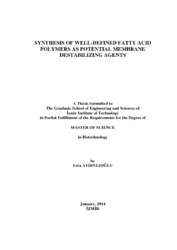Please use this identifier to cite or link to this item:
https://hdl.handle.net/11147/3669| Title: | Synthesis of Well-Defined Fatty Acid Polymers as Potential Membrane Destabilizing Agents | Authors: | Aydınlıoğlu, Esra | Advisors: | Bulmuş Zareie, Esma Volga | Publisher: | Izmir Institute of Technology | Abstract: | The aim of this thesis is to synthesize well-defined, fatty acid polymers via reversible addition fragmentation chain transfer (RAFT) polymerization, as potential membrane destabilizing agents which can be used for intracellular drug delivery applications. A new methacrylate monomer, derived from an unsaturated fatty acid, 11-[2-(2-methyl-acryloyloxy)-ethylsulfanyl] undecanoic acid (UDAMA), was synthesized using 10-undecenoic acid as a starting compound. Monomer synthesis was composed of two steps: In the first step, thiol-ene thermal addition of 2-mercaptoethanol to 10-undecenoic acid was performed. The yield of the reaction was 85 %. In the second step, the addition product was reacted with methacryoyl chloride to yield a new monomer, UDAMA. The yield of the second synthetic step was 92%, calculated from 1H NMR spectroscopy. UDAMA was polymerized via both conventional free radical and RAFT polymerization techniques. Polymers were characterized using 1H-NMR spectroscopy and gel permeation chromatography (GPC). Linear increase in ln [M]0/[M] with polymerization time, and Mn with monomer conversion indicated the RAFT-controlled polymerization of UDAMA monomer under the conditions tested. The new monomer, UDAMA was also copolymerized with methacrylic acid (MAA) via RAFT polymerization to obtain water-soluble, pH-responsive polymers. Random copolymers of MAA and UDAMA were synthesized using two different polymerization feed composition having 20 mol% or 50 mol% UDAMA content. Copolymerizations were also found to be controlled by RAFT mechanism, as evidenced by measurements via 1H-NMR spectroscopy and GPC. The pH-responsive behavior of copolymers was demonstrated via UV−visible spectroscopy and dynamic light scattering measurements. Hemolysis assays revealed that the copolymers with 20 mol% UDAMA content demonstrated pH-dependent hemolytic activity. | Description: | Thesis (Master)--Izmir Institute of Technology, Biotechnology, Izmir, 2014 Includes bibliographical references (laves: 56-61) Text in English; Abstract: Turkish and English x, 66 leaves Full text release delayed at author's request until 2017.02.06 |
URI: | http://hdl.handle.net/11147/3669 |
| Appears in Collections: | Master Degree / Yüksek Lisans Tezleri |
Files in This Item:
| File | Description | Size | Format | |
|---|---|---|---|---|
| 10026651.pdf | MasterThesis | 2.08 MB | Adobe PDF |  View/Open |
CORE Recommender
Page view(s)
13,712
checked on Apr 21, 2025
Download(s)
106
checked on Apr 21, 2025
Google ScholarTM
Check
Items in GCRIS Repository are protected by copyright, with all rights reserved, unless otherwise indicated.